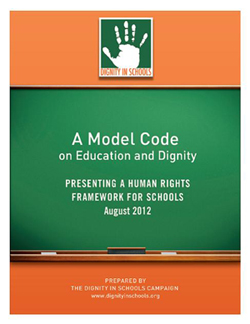Model Code on Education and Dignity – Revised 2013

The Dignity in Schools Campaign Model Code on Education and Dignity presents a set of recommended policies to schools, districts and legislators to help end school pushout and protect the human rights to education, dignity, participation and freedom from discrimination. The Code is the culmination of several years of research and dialogue with students, parents, educators, advocates and researchers who came together to envision a school system that supports all children and young people in reaching their full potential.
In October 2013, DSC released a new revised version of the Model Code, which includes new sections on: social and emotional learning, prevention and response to bullying behavior, reducing tickets and summonses issued in school, reducing racial disparities in discipline through culturally responsive classroom management, creating safe schools for LGBTQ students and other topics.
The Model Code is organized into five chapters:
1) Education,
2) Participation,
3) Dignity,
4) Freedom from Discrimination, and
5) Data, Monitoring and Accountability.
Each of these chapters addresses a different key component of providing a high quality education and reflects core human rights principles and values. Each chapter includes recommended policies for states, districts and schools.
Because the primary focus of the Code is on providing alternatives to school pushout and zero-tolerance discipline policies, Chapter 3 on Dignity is the most robust section in the Code, laying out detailed policies, practices and implementation guidelines for transforming school climate and discipline models and de-criminalizing our schools.
Read the Model Code
Read the Executive Summary
Developing the Model School Code
This Model Code is based on the best practices, research and experiences of students, parents, educators, communities, research advocates and policy-makers around the country who particpated in the Model Code Working Group.
 Community Engagement Process
Community Engagement Process
In 2011, the Dignity in Schools Campaign launched a community engagement process to gather input into the Model Code from communities 8 states around the country—California, Florida, Georgia, Illinois Louisiana, Mississippi, New York and Pennsylvania—bringing together students, parents and educators to review the draft of the Model Code and provide comments and input.
Organizations that participated in the community engagement process include: Action Communication and Education Reform (MS), Activists with a Purpose (MS), Advocates for Children of New York, Atlanta Community Engagement Team, Blocks Together(IL), Children’s Defense Fund Los Angeles, Children’s Defense Fund New York, Citizens for a Better Greenville (MS), Citizens for Educational Awareness (MS), Community Asset Development Re-Defining Education (CADRE, CA), COFI/POWER PAC (IL), Concerned Citizens for a Better Tunica County (MS), Desis Rising Up and Moving (DRUM, NY), Families and Friends of Louisiana’s Incarcerated Children (FFLIC), Generation Y (IL), Gwinnett Parent Coalition to Dismantle the School to Prison Pipeline (GA), Labor/Community Strategy Center (CA), Mississippi Delta Catalyst Roundtable, New York Civil Liberties Union, Nollie Citizens for Quality Education (MS), Parents and Youth United for a Better Webster County (MS), Philadelphia Student Union, Philadelphia Teacher Action Group, POWER U (FL), Public Counsel (CA), Southern Echo (MS), Sunflower County Parents and Students Organization (MS), Teachers Unite (NY), Youth Innovation Movement Solutions (MS), Youth Justice Coalition (CA) and Youth on the Move (NY).
Additional organizations and individuals that have contributed to the Model Code include Access Living (IL), Law Office of Piper A. Paul (CT), Restorative Schools Vision Project (CA) and many others.
Additional Resources
 model_code_cover_small
model_code_cover_small
